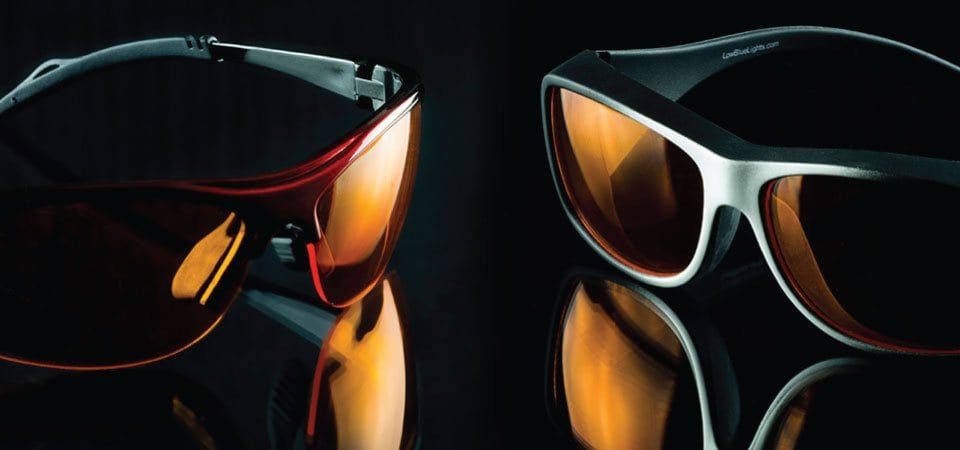By: Richard Hansler
Bipolar glasses? Are they the ones they give you when you go to see a 3D movie? No? You say they are designed to help people with bipolar disorder sleep better and help them control their moods. Awesome!! Tell me more.
The idea that wearing glasses could help people with bipolar disorder seems kind of weird, but clinical trials have shown they really work. The idea grew out of a study done many years ago. A doctor discovered that patients with rapid cycling bipolar disorder could be stabilized by having them stay in a dark bedroom from 6PM until 8AM every night. Rapid cycling bipolar patients change from depressed to manic and back to depressed in a matter of hours or days, not weeks. This treatment came to be known as “dark therapy”. Sounds spooky.
Meanwhile, other scientists discovered (2001) new sensors in the retina of the eye that did not produce vision but rather controlled the internal or circadian clock. They are different from the rods and cones that produce vision. Every cell in the body contains a clock. It’s actually a tiny part of the DNA in each cell. All the individual clocks are synchronized with the master clock, located in the hypothalamus at the base of the brain. In the early evening the master clock sends a signal to the pineal gland to start making melatonin. The concentration in the blood increases for about six hours and then drops to near zero about wakeup time. The arrival of melatonin lets the whole body know it’s nighttime. Time to rest and rebuild.
The master clock is reset by exposing the eyes to light in the morning. This keeps the master clock synchronized with the rotation of the earth. The newly discovered sensors are most sensitive to blue light. If the eyes are exposed to the blue rays in ordinary white light in the evening, it stops the master clock from sending the signal to the pineal gland to start making melatonin. This lack of melatonin (it’s called the sleep hormone) makes it hard to fall and stay asleep. The nerves from these newly discovered sensors not only go to the master clock but also to several centers in the brain that control alertness. This means the blue light exposure in the evening tells the brain it’s still daytime, time to be alert.
I had done research for GE Lighting for 42 years when I retired in 1996 and moved to John Carroll University where we formed the Lighting Innovations Institute. We began studying the effect of light on health. We learned how light exposure was having a bad effect on sleep and health by stopping the body from making melatonin.
In 2005 our small group of physicists realized that by blocking the blue rays from entering the eye, the body could be fooled into thinking it is in darkness. We developed orange glasses that block blue light. They don’t block the other colors. This meant a person could carry on normal evening activities but still start making melatonin. By bedtime there is plenty of melatonin in the blood so sleep comes quickly and deeply. One wakes up in the morning without the need of an alarm clock. We also developed light bulbs that don’t make blue light and filters for the screens of computers and smart phones.
We opened a website www.lowbluelights.com where these products are available. Thousands of people are sleeping better by using our products. We guarantee “money back” if they don’t improve sleep. They help more than 90%.
Dr. Jim Phelps is a psychiatrist working with patients experiencing rapid cycling bipolar disorder. He tried the dark therapy but found patients were not willing to endure all that time in darkness. When he learned about out glasses in 2006 he tried them and found they worked just like prolonged darkness, but patients could carry on evening activities as usual. He has been recommending orange glasses ever since. He has an excellent website www.psycheducation.org.
In 2016 Dr. Henriksen, a Norwegian psychiatrist, carried out studies in which patients hospitalized for bipolar mania were either given (at random) our orange glasses or placebo clear-lens glasses along with treatment as usual. The patients were to wear the glasses and/or sleep in darkness for 14 hours each night, i.e. dark therapy. All of the patients receiving orange glasses showed marked improvement in three days and were well after seven days. None of the clear-lens patients showed much improvement after seven days. Although a small study, it was done at three different hospitals over a couple of years. For the glasses to work so quickly and with such clear-cut results is unusual for most treatments according to Dr. Henriksen.
Over the years we have received letters thanking us for our glasses that have helped bipolar patients avoid becoming manic, especially as the days are getting longer. Improving sleep is great for everyone, not just people with bipolar disorder. Maximizing melatonin has many other health benefits as well. I’ve written five books (see Amazon or our website) describing the benefits. My most recent is “Bipolar Disorder(s): How controlling light may improve sleep and reduce the risk for episodes of depression or mania”.
Wearing orange glasses does seem a little weird, but one can just pretend you are a Hollywood celebrity!!! I would love to hear if you find our orange glasses help you sleep and in controlling your mood.


